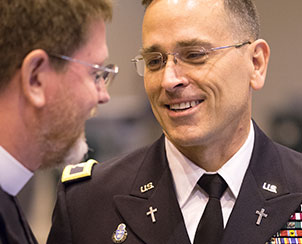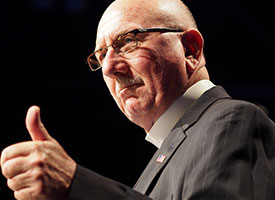By Kim Plummer Krull
ST. LOUIS (July 22, 2013) – While all 10 resolutions presented by Floor Committee 2 on Mercy carried with more than 90 percent support, a resolution supporting people with a religious and moral objection to women serving in ground combat generated considerable discussion.

Resolution 2-12A carried with 93.8 percent of delegates’ support following discussion from the floor and explanation from the stage from two veteran chaplains.
Chaplain Jonathan E. Shaw, director, Ethical Development, with the United States Army War College, called the resolution “grounded in the freedom of the Christian.” It includes “no compulsion,” Shaw said, and “only support for the conscience of those who have a religious and moral objection to women serving in direct and ground combat positions.”
Both Shaw and the Rev. Dr. Donald K. Muchow, retired rear admiral with the U.S. Navy and an outgoing member of the LCMS Board of Directors, spoke to the convention at the request of Mercy floor committee members.
In preparing the resolution, Mercy floor committee members “heard at length from people in military service” and changed wording to reflect their concerns, said the Rev. Dr. David Benke, Mercy floor committee chairman. The resolution takes into account that women serving in the military carry weapons, Benke said, and that wars are fought in many different ways.
Prior to the resolution’s presentation, the committee struck wording regarding “support of those who have a religious or moral objection to women participating in the selective service system and being subject to a possible draft.”
Since no military draft now exists, Mercy committee members saw no need to address that issue at this time, Benke said.
The resolution also refers this issue to the LCMS Committee on Theology and Church Relations (CTCR) for further study and to produce a statement that can be considered and acted upon by the Synod in its next convention.
While a resolution allowing the extension of calls to specialized pastoral ministers also generated discussion, delegates largely expressed support. Resolution 2-05B, carrying with 93.5 percent of the vote, amends Bylaw 3.8.2 so that, on the recommendation of the Office of National Mission, the Board for National Mission “shall serve as a calling agency for institutional and agency chaplains and other non-foreign specialized ministers (such as Veterans Administration, prison and hospital chaplains) after consultation with the appropriate district president(s).”
Previously, specialized pastoral ministers were hired or appointed by LCMS districts, Benke said, and now they will receive a call. Delegates speaking to the issue primarily expressed support, including one delegate who said the resolution “gives voice” to workers who often “feel marginalized.”
Delegates also adopted eight additional Mercy floor committee resolutions, each with more than 90 percent support:
- Resolution 2-01, recommending and giving thanks for the work of LCMS Disaster Response, the Synod’s mercy arm that reaches out with Christ’s love with emergency and long-term assistance, unanimously carried.
- Resolution 2-02, giving thanks and praise to God for the 75th anniversary of Lutheran Immigration and Refugee Service – an advocate on behalf of refugees, asylum seekers, unaccompanied children and other vulnerable populations – passed with unanimous support.
- Resolution 2-03, giving thanks to God and encouraging support for the ministries of Lutheran Services in America (LSA) and Lutheran World Relief (LWR), carried with 97.6 percent support. LSA serves as the connection point for more than 300 social ministry agencies. LWR works to end poverty, injustice and human suffering worldwide.
- Resolution 2-06, encouraging a strong finish of the Lutheran Malaria Initiative (LMI) and giving thanks for the effect LMI has made in the global fight to end malaria-related deaths in Africa, carried unanimously.
- Resolution 2-04, commending Lutheran Housing Support Corporation, the LCMS arm that promotes community revitalization and homeownership, passed with 98.3 percent support.
- Resolution 2-07A, to emphasize biblical teaching of sexuality, marriage and family, passed with 95.8 percent of delegate support. The resolution provides that the Office of National Mission will produce and disseminate Bible-based materials dealing with human sexuality to “empower faithful and God-pleasing lives and assist families struggling with these issues” and that pastors and congregations will be encouraged to seek practical ways to show mercy to those who “have been caught up in sexual sin, especially through confession, absolution and restoration to the body of Christ.”
- Resolution 2-11, encouraging districts and congregations to utilize the “Planting Gospel Seeds While Serving Human Needs” training process, carried with 96.3 percent of the vote. A delegate from the LCMS Atlantic District was among those expressing enthusiasm for the popular program that helps congregations identify and reach out to needs beyond their church doors.
The 65th Regular Convention of the LCMS is meeting July 20-25 at the America’s Center Convention Complex under the theme “Baptized for This Moment.” Among convention participants are some 1,200 clergy and lay voting delegates.
